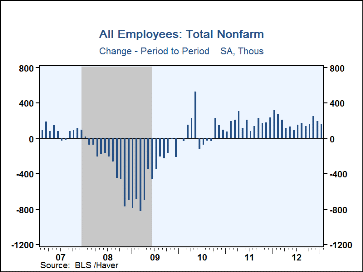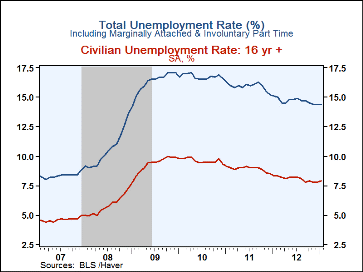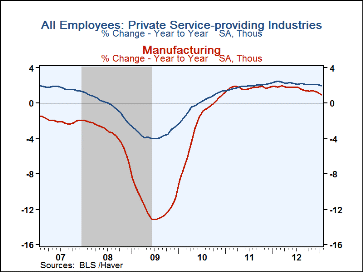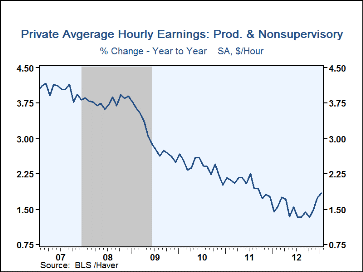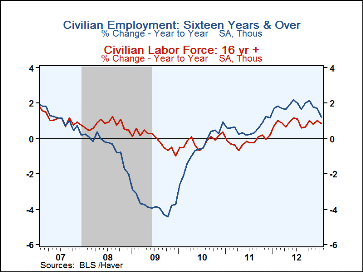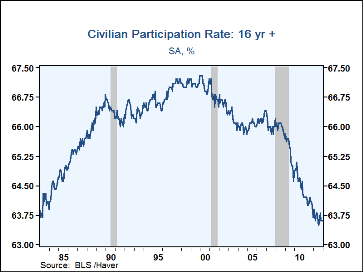 Global| Feb 01 2013
Global| Feb 01 2013U.S. Job Growth Throttles Back As Unemployment Rate Ticks Higher
by:Tom Moeller
|in:Economy in Brief
Summary
Growth in the job market continued last month. The 157,000 (1.5% y/y) rise in January payroll employment roughly matched expectations but gains throughout 2012 were revised higher. (Establishment survey variables were revised back to [...]
Growth in the job market continued last month. The 157,000 (1.5% y/y) rise in January payroll employment roughly matched expectations but gains throughout 2012 were revised higher. (Establishment survey variables were revised back to 2008.) December's rise was increased to 196,000 from 155,000 and the November gain now is pegged at 247,000 versus 161,000 estimated earlier. For the year, payroll employment growth amounts to an improved 1.7% versus 2011. From the household employment survey, the unemployment rate rose minimally last month to 7.9% from an unrevised 7.8%. The overall unemployment rate, including marginally attached workers and those involuntarily working part time, held m/m at 14.4%.
Payroll employment rose by 157,0000, the weakest increase in four months. Last month's gain was led by a 130,000 advance (2.0% y/y) in private service producing industries. That reflected a 34,000 increase (1.7% y/y) in trade, transportation & utilities and a 32,600 gain (1.4% y/y) in retail jobs. Also strong was growth in professional & business services, up 25,000 (2.6% y/y), education & health, up 25,000 (2.1% y/y), and leisure & hospitality jobs which rose 23,000 (2.4% y/y). Jobs in information services rose just 9,000 (0.8% y/y) and financial activities advanced a modest 6,000 (1.4% y/y). Construction sector jobs rose 28,000 (1.8% y/y) last month after 2.0% growth in 2012, revised up from 0.6%. Factory sector employment ticked up 4,000 (0.9% y/y).
Along with rising employment came improvement in average hourly earnings. Last month's 0.3% increase lifted the y/y growth rate to 1.8%, the strongest since last March. That was led by a 4.4% y/y advance in financial sector earnings and a 3.7% earnings increase in the information sector. Factory sector earnings lagged with 1.1% y/y growth.
The length of the average workweek held at 34.4 hours, where it's been since November. The workweek in goods producing industries of 40.1 hours was down from its peak. That compared to a 33.2 hour workweek in services, which was down from its peak early in the year.
Improved growth in average hourly earnings accompanied the improved labor market. Last month's 0.3% rise lifted the y/y earnings increase to 1.8%, its strongest since September 2011.
From the household employment survey, the unemployment rate ticked up to 7.9% after two months at 7.8%. The increase came as employment rose last month by just 17,000 (1.2% y/y) but the labor force grew 143,000 (0.8% y/y). Growth in the labor force has been held down by the participation rate which is near its low of 63.6% versus a peak of 67.1% from 1997 to 2001. The 6.5% unemployment rate for those 25 years and older compared to 16.8% for those younger than 25 and 23.4% for teenagers.
The figures referenced above are available in Haver's USECON database. Additional detail can be found in the LABOR and in the EMPL databases. The expectation figures are from Action Economics and are in the AS1REPNA database.
| Employment: (M/M Chg., 000s) | Jan | Dec | Nov | Y/Y | 2012 | 2011 | 2010 |
|---|---|---|---|---|---|---|---|
| Payroll Employment | 157 | 196 | 247 | 1.5% | 1.7% | 1.2% | -0.7% |
| Previous | -- | 155 | 161 | -- | 1.4 | 1.2 | -0.7 |
| Manufacturing | 4 | 8 | 7 | 0.9 | 1.7 | 1.7 | -2.7 |
| Construction | 28 | 30 | 24 | 1.8 | 2.0 | 0.3 | -8.3 |
| Private Service Producing | 130 | 158 | 213 | 2.0 | 2.2 | 1.9 | -0.1 |
| Government | -9 | -6 | -9 | -0.3 | -0.8 | -1.8 | -0.3 |
| Average Weekly Hours - Private Sector | 34.4 | 34.4 | 34.4 | 34.5 (Jan'12) |
34.4 | 34.4 | 34.1 |
| Average Private Sector Hourly Earnings (%) | 0.3 | 0.2 | 0.3 | 1.8 | 1.5 | 2.0 | 2.4 |
| Unemployment Rate (%) | 7.9 | 7.8 | 7.8 | 8.3 (Jan'12) |
8.1 | 8.9 | 9.6 |
Tom Moeller
AuthorMore in Author Profile »Prior to joining Haver Analytics in 2000, Mr. Moeller worked as the Economist at Chancellor Capital Management from 1985 to 1999. There, he developed comprehensive economic forecasts and interpreted economic data for equity and fixed income portfolio managers. Also at Chancellor, Mr. Moeller worked as an equity analyst and was responsible for researching and rating companies in the economically sensitive automobile and housing industries for investment in Chancellor’s equity portfolio. Prior to joining Chancellor, Mr. Moeller was an Economist at Citibank from 1979 to 1984. He also analyzed pricing behavior in the metals industry for the Council on Wage and Price Stability in Washington, D.C. In 1999, Mr. Moeller received the award for most accurate forecast from the Forecasters' Club of New York. From 1990 to 1992 he was President of the New York Association for Business Economists. Mr. Moeller earned an M.B.A. in Finance from Fordham University, where he graduated in 1987. He holds a Bachelor of Arts in Economics from George Washington University.
More Economy in Brief
 Global| Feb 05 2026
Global| Feb 05 2026Charts of the Week: Balanced Policy, Resilient Data and AI Narratives
by:Andrew Cates


